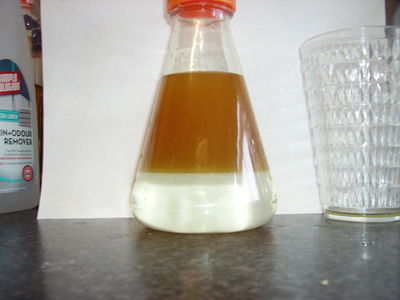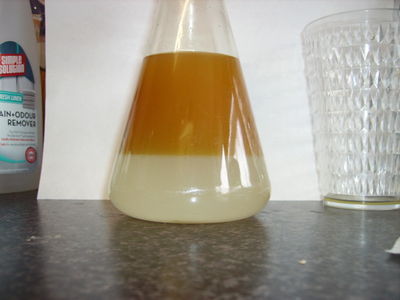Difference between revisions of "Using acetone to aid soap removal"
(→Method.) |
|||
| (2 intermediate revisions by the same user not shown) | |||
| Line 36: | Line 36: | ||
Soap content now tested at 36ppm | Soap content now tested at 36ppm | ||
| − | |||
| − | |||
| − | |||
| − | |||
| − | |||
| − | |||
| − | |||
| − | |||
| − | |||
| − | |||
| − | |||
| − | |||
| − | |||
| − | |||
| − | |||
| − | |||
| − | |||
| − | |||
| − | |||
| − | |||
| − | |||
| − | |||
| − | |||
| − | |||
| − | |||
| − | |||
| − | |||
| − | |||
| − | |||
| − | |||
| − | |||
| − | |||
| − | |||
| − | |||
| − | |||
| − | |||
| − | |||
| − | |||
| − | |||
| − | |||
==Method.== | ==Method.== | ||
| Line 86: | Line 46: | ||
| − | Turn pump off and let the water settle, this normally | + | Turn pump off and let the water settle, this normally takes a few hours to obtain a good split of bio and water. |
| Line 101: | Line 61: | ||
I see no adverse effects of adding acetone to the bio as it's quite a common practice to do this to aid combustion. | I see no adverse effects of adding acetone to the bio as it's quite a common practice to do this to aid combustion. | ||
| − | [[ | + | |
| − | + | <BR> | |
| + | <BR> | ||
| + | |||
| + | |||
| + | [[User:Mark|Mark]] 17:32, 5 February 2013 (UTC) | ||
Latest revision as of 19:55, 23 February 2013
The use of acetone to aid soap removal in water washing was something that was first discussed by Nathan and Steve on this forum,
testing has been done by Mark.
Contents
First test.
The initial test was done with a 250ml sample. This had already been water washed and had a soap content of 76ppm. It showed a clear 50/50, 4 drops of acetone were added, the test was then shaken and left to settle.
It clearly shows more soap has been liberated into the water.
Soap content now tested at 36ppm
Method.
As yet this has only been tested in conjunction with the Water washing Titrated method.
After the acid wash is drained, add 1ml of acetone to every 10L of bio in to 15% (of batch volume) water.
add this to the bio and pump for 1 hour.
Turn pump off and let the water settle, this normally takes a few hours to obtain a good split of bio and water.
At this stage, after just one wash (remember the acid wash is just for neutralisation, not soap removal) do a 50/50 soap test,
if like me you find that this gives a clear pass (water at the bottom is clear and you have a good split of bio/water) you may wish to to a titrated soap test.
I have done a titrated soap test and got a result of 42.56ppm of soap.
I would normally need to do at least 3 washes to get soaps down to this level.
I see no adverse effects of adding acetone to the bio as it's quite a common practice to do this to aid combustion.
Mark 17:32, 5 February 2013 (UTC)

